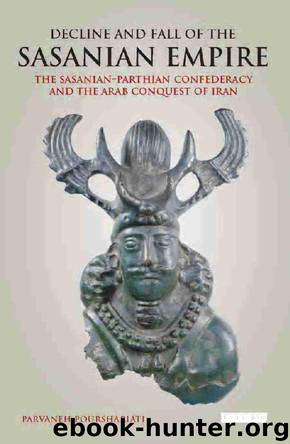Decline and Fall of the Sasanian Empire by Parvaneh. Pourshariati

Author:Parvaneh. Pourshariati [Pourshariati, Parvaneh.]
Language: eng
Format: epub
Published: 2008-02-02T23:05:30+00:00
CHAPTER 3: ARAB CONQUEST
frontier regions of Jurj¯an by name.”1466 Suwayd then “allocated the Turks of
Dihist¯an [to look after] them, removing the tribute from those who remained
to defend them and taking taxes from the remainder of the people of Jurj¯an.”1467
Who this S.¯ul was, and what precisely was being negotiated, is clarified by the
terms of the treaty that was subsequently drawn up between the two parties. In
the treaty itself S.¯ul is no longer recognized as the ruler of Gurg¯an. Rather the
treaty is addressed to “R¯
uzb¯an S.¯ul b. R¯uzb¯an and the people of Dihist¯an and
all of those of Jurj¯an.” This S.¯ul was one of the Turkic leaders who in the post-Bagratuni period of Khur¯as¯an had managed to carve for himself a domain, from
where he imposed his rule on Gurg¯an and adjacent territories, such as Dihist¯an. Tangentially, we should mention a significant chronological issue before
we proceed. While Sayf’s narrative maintains that the conquest of Gurg¯an took
place in 18 AH/639 CE,1468 T.abar¯ıalso informs us that, according to al-Mad¯a in¯ı,
the conquest of Gurg¯an took place in 30 AH/650–651 CE, more than a decade
later. There is absolutely no indication, however, that the Arabs could have
reached Gurg¯an at this early stage in 639 CE. To this important chronological
dispute we will get shortly.
The treaty between Suwayd and S.¯ul stipulated that the tribute imposed on
S.¯ul and his followers would not be in the form of monetary arrangements but
“in the form of assistance.”1469 These treaty terms were analogous, as we shall
see, to those the Arabs made with the Mihr¯anid Shahrvar¯az in the Caucasus,
where the tribute due from the conquered population was calculated in terms
of the military assistance rendered.1470 In Bal am¯ı’s account, however, the terms
of the agreement between S.¯ul and Suwayd were even more advantageous for
S.¯ul: he entered into an agreement with Suwayd on the condition that the Arabs
agreed to pay him a portion of the khar¯aj of Gurg¯an, as well as a portion of
the dues given by “those who refuse to accept Islam.”1471 Another significant
chronological indicator is provided by Bal am¯ı: S.¯ul persuaded Suwayd that this
arrangement would also benefit the Arabs, for “once the ispahbud¯an [i.e., the
plural of sp¯ahbed] of T.abarist¯an realize that he, [i.e., S.¯ul,] has made peace, they will not engage in war with the Arabs.” If they did nevertheless elect war, S.¯ul
promised that he would come forth with the army of Gurg¯an, and wage war
until T.abarist¯an was likewise conquered.1472
The ispahbud Farrukh¯an
Bal am¯ı then adds, significantly, that when the ispahbudh¯an (pl.), that is to say,
the collectivity of the ispahbuds of T.abarist¯an, heard that S.¯ul had made peace
1466T.abar¯ı 1994, p. 29, de Goeje, 2658.
1467T.abar¯ı 1994, p. 29, de Goeje, 2658.
1468T.abar¯ı 1994, p. 30, de Goeje, 2659.
1469T.abar¯ı 1994, p. 29, de Goeje, 2658.
1470See page 279.
1471Bal am¯ı 1959, p. 334.
1472Bal am¯ı 1959, p. 334.
254
Download
This site does not store any files on its server. We only index and link to content provided by other sites. Please contact the content providers to delete copyright contents if any and email us, we'll remove relevant links or contents immediately.
| Africa | Americas |
| Arctic & Antarctica | Asia |
| Australia & Oceania | Europe |
| Middle East | Russia |
| United States | World |
| Ancient Civilizations | Military |
| Historical Study & Educational Resources |
Empire of the Sikhs by Patwant Singh(22172)
The Wind in My Hair by Masih Alinejad(4424)
The Templars by Dan Jones(4189)
Rise and Kill First by Ronen Bergman(4012)
The Rape of Nanking by Iris Chang(3516)
12 Strong by Doug Stanton(3057)
Blood and Sand by Alex Von Tunzelmann(2608)
The History of Jihad: From Muhammad to ISIS by Spencer Robert(2207)
Babylon's Ark by Lawrence Anthony(2070)
No Room for Small Dreams by Shimon Peres(1991)
The Turkish Psychedelic Explosion by Daniel Spicer(1988)
Gideon's Spies: The Secret History of the Mossad by Gordon Thomas(1950)
Inside the Middle East by Avi Melamed(1939)
The First Muslim The Story of Muhammad by Lesley Hazleton(1882)
Arabs by Eugene Rogan(1836)
Bus on Jaffa Road by Mike Kelly(1784)
Come, Tell Me How You Live by Mallowan Agatha Christie(1768)
Kabul 1841-42: Battle Story by Edmund Yorke(1649)
Citizen Strangers by Robinson Shira N.;(1535)
